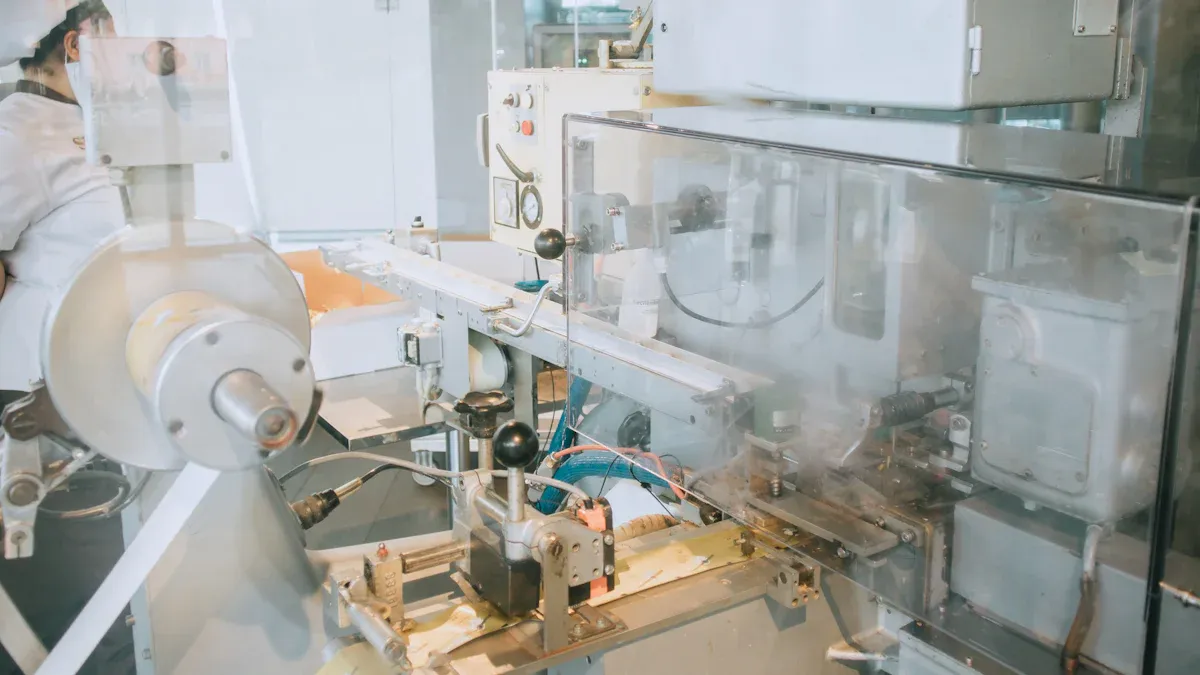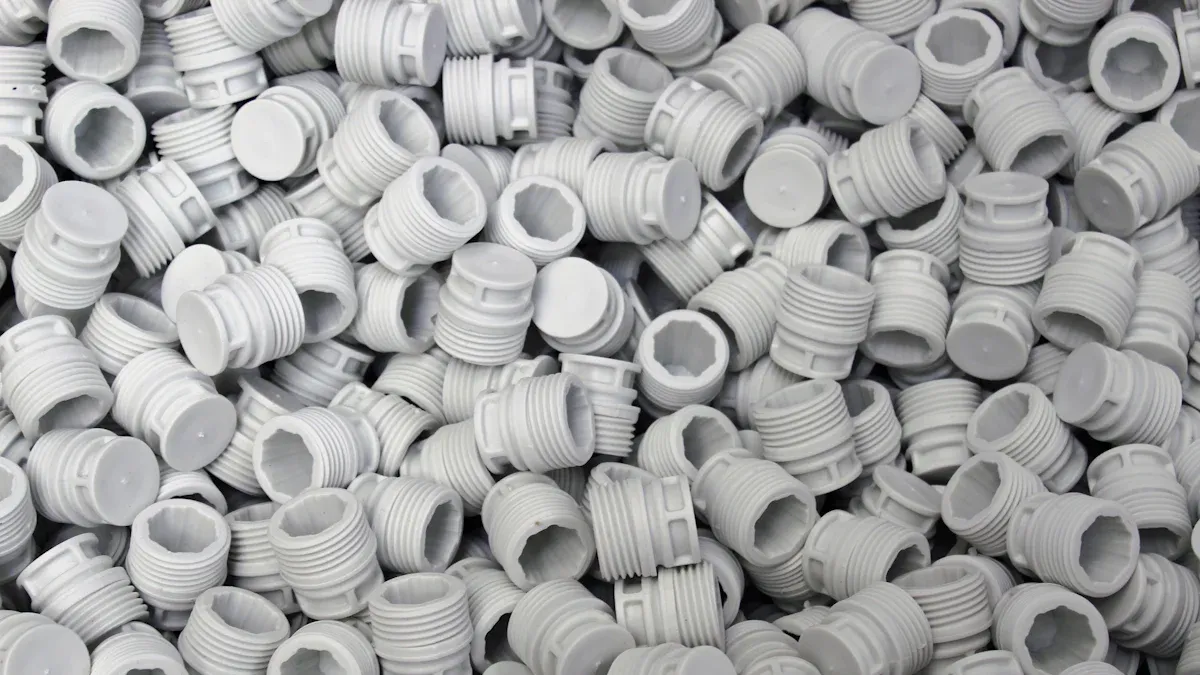
The demand for high-quality plastic injection molded parts continues to grow, and finding the right supplier has become essential for businesses. In 2025, several suppliers stand out for their commitment to excellence and innovation. Many suppliers prioritize diversity, with 38% being minority-owned, 30% woman-owned, and 8.4% veteran-owned. Certifications like ISO 9001:2008 and ISO 9001:2015 further ensure their commitment to quality. These suppliers not only excel in producing plastic injection molding parts but also deliver customized solutions for unique applications. Their focus on precision and reliability sets them apart in the competitive landscape of plastic injection moulded products.
Key Takeaways
- Pick suppliers with trusted quality certifications like ISO 9001 for strong, lasting plastic parts.
- Check if a supplier can produce and customize parts to fit your needs well.
- Choose suppliers who offer clear prices and ways to save money to get the best value.
- Make sure suppliers deliver on time by looking at their delivery records and customer reviews.
- Work closely with suppliers by talking openly and setting clear goals for better teamwork.
Criteria for Selecting a Plastic Injection Molding Part Supplier

Quality Standards and Certifications
Suppliers of plastic injection molding parts must meet stringent quality standards to ensure reliable and durable products. Certifications serve as benchmarks for assessing their commitment to excellence.
- ISO 9001: This global standard focuses on customer satisfaction and continuous improvement, ensuring consistent quality across production processes.
- ISO 13485: Tailored for medical devices, this certification emphasizes management responsibility and product realization, guaranteeing high-quality standards for healthcare applications.
- IATF 16949: Specific to the automotive industry, this certification ensures precision and quality in production processes.
- ITAR Compliance: Suppliers adhering to ITAR regulations safeguard sensitive technologies, making them ideal for military applications.
A supplier’s performance can also be evaluated through metrics such as defect rates, audit results, and overall quality scores.
| Metric/Certification | Description |
|---|---|
| Supplier defect rate | Percentage of defective products received from suppliers. High rates indicate quality issues. |
| Supplier audit results | Outcomes of audits assessing compliance with quality standards and regulations. |
| Supplier quality score | Composite score evaluating various quality metrics, providing an overall assessment of supplier quality. |
Production Capabilities and Customization Options
The ability to meet diverse production needs is a critical factor when selecting a supplier. Suppliers with advanced machinery and flexible production lines can handle complex designs and high-volume orders. Customization options allow businesses to create unique plastic injection molding parts tailored to specific applications.
Modern suppliers often utilize technologies like computer-aided design (CAD) and rapid prototyping to streamline the development process. These tools enable faster iterations and ensure precision in the final product. Additionally, suppliers with multi-material capabilities can produce parts using various resins, enhancing versatility.
Tip: Collaborating with suppliers who offer design assistance can help optimize part functionality and reduce production costs.
Cost-Effectiveness and Pricing Transparency
Cost-effectiveness goes beyond competitive pricing; it includes strategies that maximize value while minimizing waste. Transparent pricing practices build trust and help businesses plan budgets effectively.
- Collaboration for Pricing: Suppliers like PlastiCert emphasize working closely with customers to secure the best resin pricing through reliable forecasts.
- Bulk Purchasing: Companies such as Pioneer streamline material needs by utilizing bulk purchase orders, reducing costs significantly.
- Alternative Material Identification: Plastikos collaborates with customers to identify alternative raw materials, saving millions annually for clients like medical device manufacturers.
Suppliers who prioritize cost-saving measures without compromising quality stand out in the competitive landscape of plastic injection molding parts.
Delivery Times and Reliability
Reliable delivery times play a crucial role in the success of any business relying on plastic injection molding parts. Suppliers who consistently meet deadlines help businesses maintain production schedules and avoid costly delays. Evaluating a supplier’s delivery performance involves analyzing their on-time delivery rates and customer satisfaction scores.
Suppliers with high on-time delivery rates demonstrate their ability to manage logistics effectively. Over the years, industry leaders have shown steady improvement in this area. For instance, data reveals that top suppliers achieved a 95% on-time delivery rate in 2022, surpassing the industry average of 92%. This consistent performance highlights their reliability and commitment to meeting customer expectations.
| Year | On-Time Delivery Rate (%) | Industry Average (%) |
|---|---|---|
| 2020 | 92% | 90% |
| 2021 | 94% | 91% |
| 2022 | 95% | 92% |
Customer satisfaction scores (CSAT) further reflect a supplier’s reliability. High CSAT scores correlate with better customer retention rates, emphasizing the importance of dependable delivery. Suppliers with scores above 90% retain over 85% of their customers, significantly outperforming the industry benchmark of 80%. This level of satisfaction often stems from timely deliveries and proactive communication during the production process.
| CSAT Score | Impact on Customer Retention | Average Industry Benchmark |
|---|---|---|
| 90% and above | High retention: 85%+ | 80% |
| 70-89% | Moderate retention: 60-84% | 70% |
| Below 70% | Low retention: Below 60% | 50% |
Tip: Businesses should prioritize suppliers with proven delivery reliability and strong customer satisfaction metrics. These factors ensure smoother operations and long-term partnerships.
In addition to metrics, suppliers who offer real-time tracking and updates provide added value. Transparency in delivery processes allows businesses to plan effectively and address potential disruptions. This proactive approach strengthens trust and fosters collaboration between suppliers and clients.
Reliable delivery times and consistent performance are essential for businesses seeking high-quality plastic injection molding parts. Suppliers who excel in these areas not only meet deadlines but also contribute to the overall efficiency of their clients’ operations.
Profiles of the Best Plastic Injection Molding Part Suppliers in 2025

Xometry: Overview and Key Offerings
Xometry has established itself as a leader in the plastic injection molding industry by leveraging advanced technology and a robust marketplace model. The company’s AI-powered instant quoting engine allows buyers to receive accurate pricing based on factors like material, design complexity, and production volume. This innovative approach enhances customer engagement and streamlines the procurement process.
In 2024, Xometry reported a 23% increase in marketplace revenue, reaching $486 million. This growth highlights the company’s ability to scale its services and meet the evolving needs of its clients. Additionally, the number of active suppliers on Xometry’s platform grew by 36% year-over-year, from 2,529 to 3,429. This expansion reflects the platform’s effectiveness in connecting buyers with reliable suppliers.
Note: Xometry’s focus on core services has driven its success, despite a 13% decline in supplier services revenue in 2024 due to the exit from non-core offerings.
Xometry’s commitment to innovation and efficiency makes it a top choice for businesses seeking high-quality plastic injection molding parts. Its ability to adapt to market demands ensures long-term value for its clients.
ProtoLabs: Overview and Key Offerings
ProtoLabs stands out for its emphasis on speed, quality, and customer satisfaction. The company employs Industry 4.0 technologies, such as automation and data analytics, to optimize its manufacturing processes. These advancements enable ProtoLabs to deliver precision-engineered parts while maintaining operational efficiency.
In 2023, ProtoLabs demonstrated strong performance metrics:
- Gross margins improved to 45% in Q2 2024, reflecting better cost control.
- Enhanced productivity among employees contributed to higher organizational performance.
- Stringent quality control measures ensured that every product met high standards, boosting customer satisfaction.
Despite a 5.1% decline in customer contacts in 2023, ProtoLabs achieved modest revenue growth. This shift indicates a strategic focus on high-value relationships rather than sheer volume. By prioritizing quality over quantity, the company has solidified its reputation as a reliable supplier of plastic injection molding parts.
ProtoLabs’ ability to combine advanced technology with a customer-centric approach positions it as a leader in the industry. Its focus on continuous improvement ensures that clients receive exceptional value.
MSI Mold: Overview and Key Offerings
MSI Mold has built a reputation for delivering high-quality molds and parts through lean manufacturing practices. The company’s focus on efficiency and precision has driven consistent growth in recent years.
| Metric | Value |
|---|---|
| Sales | $16 million |
| Sales Growth | 9% per year for the past 3 years |
| Average Lead Time | 8 weeks for a 1,000-hour mold |
| Employee Count | More than 100 |
| Focus Areas | Lean manufacturing, efficiency, sales metrics |
MSI Mold’s ability to maintain an average lead time of just eight weeks for complex molds demonstrates its operational efficiency. The company’s lean manufacturing approach minimizes waste and maximizes productivity, ensuring cost-effective solutions for its clients.
Tip: Businesses seeking reliable suppliers should consider MSI Mold for its proven track record in delivering high-quality products on time.
With a dedicated team of over 100 employees, MSI Mold continues to innovate and expand its capabilities. Its commitment to excellence makes it a trusted partner for businesses across various industries.
Universal Plastic Mold (UPM): Overview and Key Offerings
Universal Plastic Mold (UPM) has been a trusted name in the plastic injection molding industry for over 50 years. Based in California, UPM specializes in providing end-to-end manufacturing solutions, making it a one-stop shop for businesses seeking high-quality molded parts. The company’s vertically integrated approach allows it to handle every stage of production, from design and prototyping to final assembly and packaging.
Key Strengths of UPM:
- Advanced Manufacturing Capabilities: UPM operates a state-of-the-art facility equipped with over 37 injection molding machines. These machines range from 85 to 1,500 tons, enabling the production of parts in various sizes and complexities.
- Sustainability Initiatives: The company prioritizes eco-friendly practices by using recycled materials and energy-efficient machinery. This commitment to sustainability aligns with the growing demand for environmentally responsible manufacturing.
- Custom Solutions: UPM excels in creating tailored solutions for industries such as automotive, consumer goods, and medical devices. Their in-house engineering team collaborates closely with clients to optimize designs for functionality and cost-effectiveness.
Note: UPM’s ability to manage large-scale production while maintaining strict quality standards makes it a preferred partner for businesses across diverse sectors.
In addition to its technical expertise, UPM emphasizes customer satisfaction. The company’s robust quality control processes ensure that every plastic injection molding part meets or exceeds client expectations. With a proven track record of reliability and innovation, UPM continues to set benchmarks in the industry.
D&M Plastics LLC: Overview and Key Offerings
D&M Plastics LLC, headquartered in Illinois, has earned a reputation for precision and consistency in plastic injection molding. Established in 1972, the company focuses on delivering high-quality parts for industries with stringent requirements, such as healthcare, aerospace, and electronics.
What Sets D&M Plastics Apart:
- Zero-Defect Manufacturing: D&M Plastics employs a zero-defect manufacturing philosophy, ensuring that every part produced is free from flaws. This approach minimizes waste and enhances product reliability.
- ISO-Certified Processes: The company holds ISO 9001 and ISO 13485 certifications, reflecting its commitment to quality and regulatory compliance. These certifications make D&M Plastics a trusted supplier for critical applications, particularly in the medical field.
- Lean Manufacturing Practices: By adopting lean manufacturing principles, D&M Plastics reduces production costs and lead times. This efficiency benefits clients by providing cost-effective solutions without compromising quality.
| Feature | Details |
|---|---|
| Facility Size | 57,000 square feet |
| Industries Served | Healthcare, Aerospace, Electronics |
| Certifications | ISO 9001, ISO 13485 |
| Production Philosophy | Zero-Defect Manufacturing |
D&M Plastics also invests heavily in employee training and advanced technology. The company’s skilled workforce and cutting-edge equipment enable it to tackle complex projects with precision.
Tip: Businesses requiring high-precision plastic injection molding parts should consider D&M Plastics for its expertise in zero-defect manufacturing and regulatory compliance.
With over five decades of experience, D&M Plastics has built long-term relationships with clients by consistently delivering exceptional results. Its focus on quality, efficiency, and customer satisfaction makes it a standout choice in the competitive landscape of plastic injection molding.
How to Evaluate and Collaborate with a Plastic Injection Molding Part Supplier
Questions to Ask Before Partnering
Choosing the right supplier begins with asking the right questions. These inquiries help businesses assess the supplier’s capabilities and alignment with their needs:
- What are your primary products and services?
- How long have you been providing injection molding services?
- What is your minimum order quantity?
- Can you detail your quality control processes?
- Do you handle in-house design and manufacturing?
- How are your engineers and technical staff trained?
- What certifications do you hold?
- Can you provide references or case studies from past projects?
These questions uncover critical details about the supplier’s expertise, reliability, and ability to meet specific requirements. For example, understanding their quality control processes ensures consistent production standards, while references offer insights into their track record.
Tips for Building a Long-Term Relationship
Strong supplier relationships lead to better outcomes. Companies that invest in these partnerships often see 15% higher profits compared to those that do not. To foster collaboration, consider these strategies:
- Gradually introduce new technologies to ensure smooth transitions and employee buy-in.
- Define measurable KPIs to track progress and success.
- Maintain open communication and provide training to align teams effectively.
These practices enhance trust and operational efficiency. For instance, setting KPIs allows both parties to measure success objectively, while phased technology adoption minimizes disruptions.
| Partnership Benefits | Impact on Profits |
|---|---|
| Improved Material Quality | Reduces waste, resulting in up to 20% cost savings |
| Better Negotiation Leverage | Increases profit margins by 5-10% |
| Access to Innovative Solutions | Enhances product offerings and competitiveness |
Common Pitfalls to Avoid
Several pitfalls can hinder successful collaboration. Businesses should avoid these common mistakes:
- Failing to verify certifications and quality standards.
- Overlooking the importance of clear communication.
- Relying on a single supplier without contingency plans.
Neglecting these areas can lead to production delays, quality issues, or financial losses. For example, relying on one supplier increases vulnerability to disruptions, while unclear communication can result in misaligned expectations. Proactively addressing these challenges ensures smoother operations and stronger partnerships.
Selecting the right supplier for plastic injection molding parts ensures consistent quality, cost efficiency, and reliable delivery. Suppliers like Xometry, ProtoLabs, and D&M Plastics excel in precision, innovation, and customer satisfaction. Their unique strengths, such as advanced manufacturing capabilities and zero-defect processes, set them apart.
| Process Parameter | Effect on Molding Quality |
|---|---|
| Mould Pressure | Ensures part replication and reduces defects |
| Injection Speed | Fills small cavities before solidification |
| Cooling Time | Improves part flatness and overall quality |
Tip: Research these suppliers and evaluate their offerings to find the best fit for your needs. Taking action today can lead to long-term success.
FAQ
What is plastic injection molding?
Plastic injection molding is a manufacturing process that creates parts by injecting molten plastic into a mold. The mold shapes the plastic into the desired form as it cools and solidifies. This method is widely used for producing durable and precise components.
How do I choose the right material for my project?
Material selection depends on the application. Factors like strength, flexibility, and temperature resistance should guide the choice. Suppliers often provide guidance on selecting the best resin for specific needs. Collaborating with experts ensures optimal results.
Can suppliers handle small production runs?
Many suppliers offer flexibility in production volumes. Companies like ProtoLabs specialize in low-volume manufacturing, making them ideal for prototypes or niche products. Businesses should confirm minimum order quantities before partnering with a supplier.
What industries benefit from plastic injection molding?
Plastic injection molding serves industries like automotive, healthcare, electronics, and consumer goods. It provides precision and scalability, making it suitable for applications requiring high-quality, customized parts. Suppliers often tailor solutions to meet industry-specific demands.
How can I ensure quality in molded parts?
Quality assurance involves verifying certifications like ISO 9001 and inspecting defect rates. Suppliers with robust quality control processes and zero-defect manufacturing philosophies, such as D&M Plastics, deliver reliable products. Regular audits and performance reviews help maintain standards.
Post time: Jun-06-2025